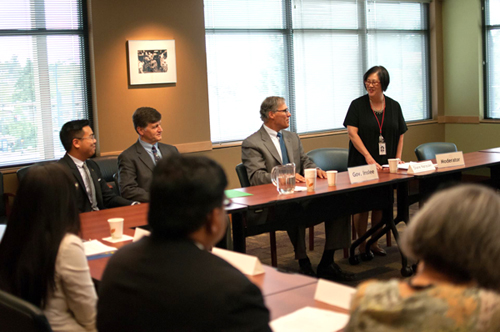By Charles Lam
Northwest Asian Weekly

Gov. Inslee and part of his health care team meeting with leaders from the APA community. Diane Narasaki (right) acted as moderator.
When the Washington Health Benefit Exchange opens its virtual doors on Oct. 1, approximately 250,000 Washington state residents will become eligible for the Medicaid expansion under the Affordable Care Act (ACA), colloquially known as Obamacare. But while the online roll out is going smoothly for most Washingtonians, the APA population — particularly immigrants and refugees — may face greater issues with access due to a lack of access to computers and the Internet, a lack of outreach, or other issues. To address these problems, Gov. Jay Inslee and members of his health care team met with leaders in the APA community on Sept. 20 to discuss these issues.
“One of the most exciting features about the ACA is its goal of closing the health-care gap,” said Diane Narasaki, executive director of Asian Counseling and Referral Service (ACRS). “But to realize the goal of the act, access is going to be key. Many people in our community cannot access online resources; they don’t have the language ability or means to go online. They’re going to need community organizations to help.”
Many of the provisions in the ACA will be beneficial to immigrants and refugees when they take effect. Under the law, most currently uninsured people in Washington will be required to have health insurance or pay a penalty of $95 per year for adults, $47.50 per child and up to $285 per family or 1 percent of family income, whichever is greater.
Insurance plans can be purchased on the Washington Health Benefit Exchange or on the open market. Uninsured legal residents who make up to $45,950 and families of four who make up to $94,200 may qualify for subsidies and tax credits when purchasing insurance. Those who make less than 138 percent of the poverty level — currently $15,856 for an individual or $32,499 for a family of four — may qualify for free or nearly free insurance under the Medicaid expansion.
But despite the increased coverage, according to some leaders, the law has some deficiencies that need to be addressed.
“One of the biggest concerns that a lot of us have is that there is really no Medicaid outreach money,” said Tony Lee, advocacy director at Solid Ground, a Seattle-based, anti-poverty organization. “I spoke with women in two shelters in Everett who would be eligible under the expansion —none of them knew about the program.”
“In our population, outreach dollars are very, very important because you’re dealing with people who might not have access to the Internet or access to TV,” added Hyeok Kim, executive director of InterIm Community Development Association. “Presently, 87 percent of children in Washington are covered under Apple Health, but that’s because of the outreach dollars that were attached to the program.”
Excluding English and Spanish, four of the top five languages of those eligible for Medicaid in King County are APA languages, including Punjabi, Korean, Vietnamese, and Chinese, according to King County Public Health.
In an August 2013 study released by the APIA Health Forum conducted in California, a majority of participants expressed a preference to receiving information through community outreach or community-based education initiatives such as community events, education training and student groups. Some participants also expressed a preference to receiving information through ethnic media such as ethnic newspapers, radio and television.
“We’re all for ACA, but we want to make sure any changes that happen don’t accidentally undermine the existing culturally competent good care for APA community,” Narasaki said. “We know that anytime there’s a change to an existing program, we know that there’s a danger to existing things.”
Other opportunities to improve public health were discussed during the meeting, including the possibility of improving data collection and the integration of social and human services into a larger scope health plan.
Currently, health data is aggregated into few categories, obfuscating possible issues with specific populations. While overall APA health data is promising, certain populations such as Thai, Cambodian, Laotian and Vietnamese face specific issues and may not get the help needed if better data is not available.
Overall, the Inslee administration has been open to insights. Inslee instructed his senior health policy advisor, Bob Crittenden, to look into issues brought up by the community members, though he did stress roadblocks and issues due to heavy bipartisanism. (end)
For more information about the Washington Health Benefit Exchange, visit www.wahbexchange.org.
Charles Lam can be reached at Charles@nwasianweekly.com.



